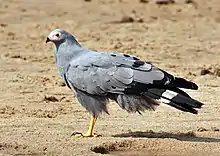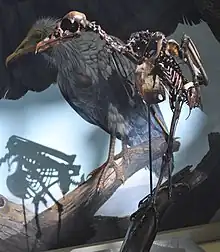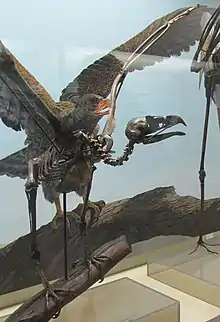Gypaetinae
The Gypaetinae is one of two subfamilies of Old World vultures the other being the Aegypiinae. Some taxonomic authorities place the Gypaetinae within the Perninae hawks. They are presently found throughout much of Africa, Asia, and southern Europe, hence being considered "Old World" vultures, but as recently as the Late Pleistocene, they were also present in North America.[1]
| Gypaetinae | |
|---|---|
 | |
| Bearded vulture (Gypaetus barbatus) | |
| Scientific classification | |
| Domain: | Eukaryota |
| Kingdom: | Animalia |
| Phylum: | Chordata |
| Clade: | Dinosauria |
| Class: | Aves |
| Order: | Accipitriformes |
| Family: | Accipitridae |
| Subfamily: | Gypaetinae |
| Genera | |
|
See text. | |
A 2005 study found Eutriorchis astur to be closely related.[2]
Species
Extant genera
| Subfamily | Genus | Common and binomial names | Image | Range |
|---|---|---|---|---|
| Gypaetinae | Gypaetus Storr, 1784 | Bearded vulture Gypaetus barbatus |
 |
High mountains in southern Europe, the Caucasus, Africa, the Indian subcontinent, and Tibet |
| †Gypaetus georgii | Fossil record from the late Miocene, Spain[2] | |||
| Gypohierax Rüppell, 1836 | Palm-nut vulture Gypohierax angolensis |
.jpg.webp) |
Forest and savannah across sub-Saharan Africa | |
| Neophron Savigny, 1809 | Egyptian vulture Neophron percnopterus |
 |
Southwestern Europe and northern Africa to India | |
| †Neophron lolis | Fossil record from the late Miocene, Spain[2] | |||
| Polyboroides A. Smith, 1829 |
African harrier-hawk, Polyboroides typus |
 |
Sub Saharan Africa | |
| Madagascan harrier-hawk, Polyboroides radiatus | Madagascar |
Fossil genera
Genera known only from fossils include:[1]
| Subfamily | Genus | Common and binomial names | Image | Range |
|---|---|---|---|---|
| Gypaetinae | †Anchigyps | †Anchigyps voorhiesi | Late Miocene to early Pliocene of North America | |
| †Arikarornis | †Arikarornis macdonaldi | Early Miocene of North America | ||
| †Mioneophron | †Mioneophron longirostris | Late Miocene of China | ||
| †Neophrontops | †Neophrontops americanus |  |
Miocene to Late Pleistocene of North America | |
| †Neophrontops dakotensis | ||||
| †Neophrontops slaughteri | ||||
| †Neophrontops vallecitoensis | ||||
| †Neophrontops vetustus | ||||
| †Neogyps
(sometimes placed in the Aegypiinae) |
†Neogyps errans |  |
Late Pleistocene of North America | |
| †Palaeoborus
(sometimes placed in the Aegypiinae) |
†Palaeoborus howardae | Miocene of North America | ||
| †Palaeoborus rosatus | ||||
| †Palaeoborus umbrosus |
References
- Li, Zhiheng; Clarke, Julia A.; Zhou, Zhonghe; Deng, Tao (2016-10-01). "A new Old World vulture from the late Miocene of China sheds light on Neogene shifts in the past diversity and distribution of the Gypaetinae". The Auk. 133 (4): 615–625. doi:10.1642/AUK-15-240.1. ISSN 1938-4254.
- Sánchez-Marco, Antonio (2022). "Two new Gypaetinae (Accipitridae, Aves) from the late Miocene of Spain". Historical Biology. 34 (8): 1534–1543. doi:10.1080/08912963.2022.2053117.
Other sources
- Ferguson-Lees, James; Christie, David A. (2001). Raptors of the World. Illustrated by Kim Franklin, David Mead, and Philip Burton. Houghton Mifflin. ISBN 978-0-618-12762-7. Retrieved 2011-05-26.
- Grimmett, Richard; Inskipp, Carol; Inskipp, Tim (1999). Birds of India, Pakistan, Nepal, Bangladesh, Bhutan, Sri Lanka, and the Maldives. Illustrated by Clive Byers et al. Princeton University Press. ISBN 978-0-691-04910-6. OCLC 43578307.
- Lerner, Heather R. L.; Mindell, David P. (November 2005). "Phylogeny of eagles, Old World vultures, and other Accipitridae based on nuclear and mitochondrial DNA" (PDF). Molecular Phylogenetics and Evolution. 37 (2): 327–346. doi:10.1016/j.ympev.2005.04.010. ISSN 1055-7903. PMID 15925523. Retrieved 31 May 2011.
This article is issued from Wikipedia. The text is licensed under Creative Commons - Attribution - Sharealike. Additional terms may apply for the media files.